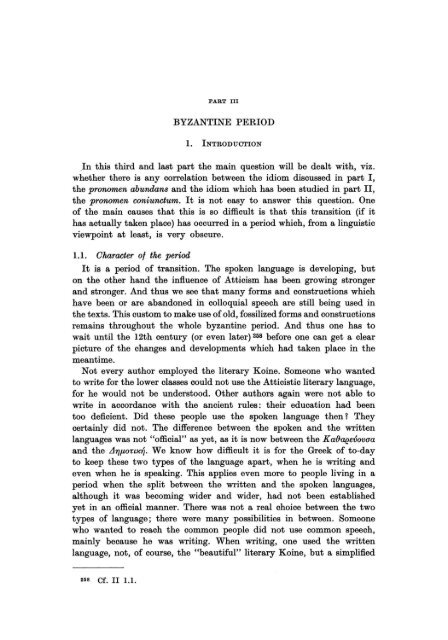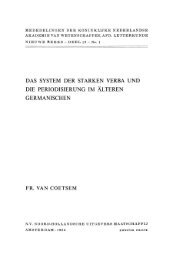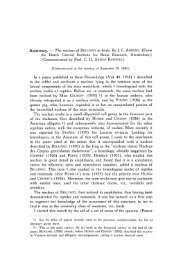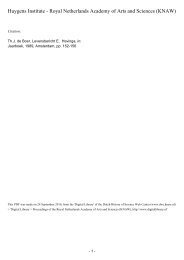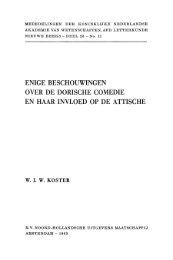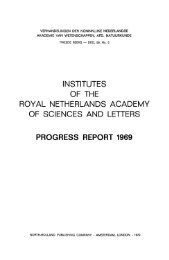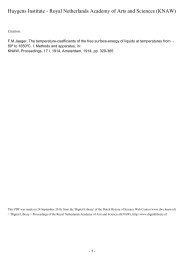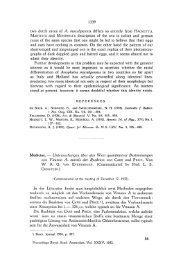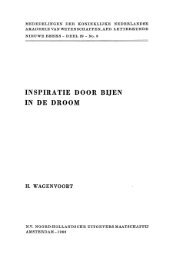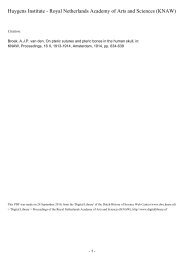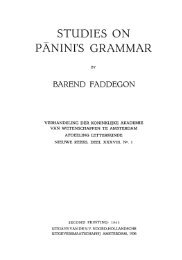Pronomen Abundans and Pronomen Coniunctum. A ... - DWC
Pronomen Abundans and Pronomen Coniunctum. A ... - DWC
Pronomen Abundans and Pronomen Coniunctum. A ... - DWC
Create successful ePaper yourself
Turn your PDF publications into a flip-book with our unique Google optimized e-Paper software.
PART III<br />
BYZANTINE PERIOD<br />
1. INTRODUCTION<br />
,In this third <strong>and</strong> last part the main question will be dealt with, viz,<br />
whether there is any oorrelation between the idiom disoussed in part I,<br />
the pronomen abundans <strong>and</strong> the idiom whioh has been studied in part 11,<br />
the pronomen coniundum. It is not easy to answer this question. One<br />
of the main oauses that this is so difficult is that this transition (if it<br />
has actually taken plaoe) has ooourred in a period which, from a linguistic<br />
viewpoint at least, is very obscure.<br />
1.1. Oharacter ot the period<br />
It is a period of transition. The spoken language is developing, but<br />
on the other h<strong>and</strong> the influence of Atticism has been growing stronger<br />
<strong>and</strong> stronger. And thus we see that many forma <strong>and</strong> constructions which<br />
have been or are ab<strong>and</strong>oned in colloquial speech are still being used in<br />
the texts. 1'his cu stom to make use of old, fossilized forms <strong>and</strong> constructions<br />
remains throughout the whole byzantine period. And thus one has to<br />
wait until the 12th oentury (or even later) 258 before one can get a olear<br />
picture of the changes <strong>and</strong> developments which had taken place in the<br />
meantime.<br />
Not every author employed the literary Koine. Someone who wanted<br />
to write for the lower olasses oould not use the Atticistio literary language,<br />
for he would not be understood. Other authors again were not able to<br />
write in accordance with the ancient rules: their education had been<br />
too deficient. Did these people use the spoken language then? They<br />
oertainly did not. The difference between the spoken <strong>and</strong> the wI'itten<br />
languages was not "official" as yet, as it is now between the Ka{}aeevovaa<br />
<strong>and</strong> the L11JI-l0Tt"7). We know how difficult it is for the Greek of to-day<br />
to keep these two types of the language apart, when he is writing <strong>and</strong><br />
even when he is speaking. This applies even more to people living in a<br />
period when the split between the written <strong>and</strong> the spoken languages,<br />
although it was becoming wider <strong>and</strong> wider, had not been established<br />
yet in an official manner. There was not a real ohoioe between the two<br />
types of language; there were many possibilities in between. Someone<br />
who wanted to reaoh the common people did not use common speech,<br />
mainly beoause he was writing. When writing, one used the written<br />
language, not, of course, the "beautiful" literary Koine, but a simplified<br />
!fiS Cf. 11 1.1.


